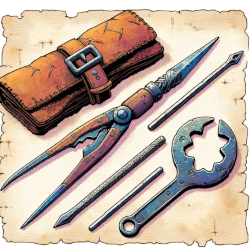


Mechanical Mastery equips Vagabonds with the essential skills to interact with mechanical elements encountered in their adventures. Whether navigating perilous traps, disarming dangerous mechanisms, or unlocking secured areas, this ability enhances their capability to overcome obstacles and accomplish their objectives in diverse environments. As a result, stands as a testament to a Vagabond's resourcefulness, adaptability, and ingenuity and allows them to work diligently to neutralize threats, turning once-dangerous obstacles into mere inconveniences on their path to progress.
Specifically, this ability may be used in three different ways:
The first one, known as Trap Knowledge, enables Vagabonds to identify the specific location and understand the workings of traps. It allows them to search for traps within their vicinity, taking varying durations based on their level of awareness. Once a trap is located, the Vagabond can attempt to disarm it using their Disarm Trap skill, reducing the risk of activation and potential harm. Mastery of Trap Knowledge is crucial for navigating dangerous environments and avoiding deadly surprises.
The second one, known as Disarm Trap, allows Vagabonds to disable traps they've successfully identified using Trap Knowledge. By effectively deactivating the trap, they prevent its triggering and potential harm. However, failure in disarming may result in the trap activating normally, posing risks to the Vagabond. Mastery of Disarm Trap allows the Vagabond to safely navigate treacherous areas and overcome obstacles that would otherwise impede their progress.
The third one, known as Lockpick Mastery, grants Vagabonds the proficiency to pick normal and combination locks swiftly and discreetly. By using specialized tools, they can attempt to open padlocks with varying degrees of complexity. Success grants them access to locked areas, while failure may result in jammed locks or broken tools.
Trap Knowledge

Through the use of this method, the Vagabond can utilize this ability to search for the specific location of a trap and understand its general functioning.
This method of using this ability is modified by the score that the Vagabond has in Observation as follows:
| Observation Score | Modifier | Observation Score | Modifier |
| 30 | -18% | 65 | +3% |
| 35 | -15% | 70 | +6% |
| 40 | -12% | 75 | +9% |
| 45 | -9% | 80 | +12% |
| 50 | -6% | 85 | +15% |
| 55 | -3% | 90 | +18% |
| 60 | None | 95+ | +21% |
To use the skill in this way, it is not strictly necessary the use of Vagabonds' Tools. However, if the Vagabond tries to use this skill without Vagabonds' Tools a penalty of -10% will be applied to the test.
This method can be employed, with various modifications, whether the Vagabond is completely unaware of the presence of a trap or is conscious of its existence. In this regard, three different scenarios can be distinguished:
1)
The Vagabond is unaware of the presence of the
trap: this occurs when, despite not being
aware of the trap's presence, the Vagabond suspects it may be in a certain
location and decides to search for it nonetheless.
2) The Vagabond is aware of the presence
of the trap in the search area but does not know the specific location:
this occurs, for example, when the Vagabond has passed a passive and automatic
test in the Trap Sense ability (link) or has been informed of the trap's presence in a
generic manner through other means.
3) The Vagabond knows the specific
location of the trap: this occurs, for
example, when the Vagabond has witnessed the trap being triggered or has
obtained precise information about its location (such as through certain magic
spells related to arcane disciplines like Revelation).
The time required
to conduct the search operation varies depending on whether the Vagabond is
aware of the trap's presence:
- The Vagabond is unaware of the trap's presence: 2d6+3 rounds
- The Vagabond is aware of the trap's presence but does not know the specific
location: 2d6 rounds
- The Vagabond knows the specific location of the trap: 1d6+1 rounds
The search area examined by the Vagabond during this period is equivalent to an area with a radius of 15 meters from the position occupied by the Vagabond when this operation begins. At the end of the search period, the Vagabond makes a test in this ability. It is noted that if the Vagabond is unaware of the trap's presence, this check is made secretly, and the Vagabond cannot modify it in any way, thus cannot use Fate Points and Divine Points. In other cases, however, the Vagabond may choose to modify or repeat the check using their own resources normally (please note that as an exception to the general rules, even if the attempt requires more that 10 rounds Fate Points could be still used to modify the roll).
If the test succeeds, the Vagabond will have found the trap (if present) and understood its general functioning without triggering it. If the test fails, the Vagabond will not have found the trap, but having operated with extreme caution, he or she will not have triggered it either. It is noted that the Vagabond cannot attempt to search for traps in the same area until they have reached a new level of experience. However, if the Vagabond has failed to identify the specific type and location of a trap they believed to be present in the area without having seen it or knowing its specific nature, they may retry to perform the test once they precisely realize the presence of the trap and its specific location (i.e., when the Vagabond has subsequently witnessed the trap being triggered or has obtained precise information about its location).
The Vagabond does not necessarily have to walk in the search area; therefore, whether the Vagabond finds the trap or not, in terms of gameplay, they will be considered to have remained stationary in the position where the search operation began.
The following modifiers apply to the trap search check:
Awareness of the
Trap
- The Vagabond is unaware of the trap's presence: -25%
- The Vagabond is aware of the trap's presence but does not know the specific
location: No Modifier
- The Vagabond knows the specific location of the trap: +25%
Trap Type and Complexity
- A penalty of -10% for each difficulty rank of the trap beyond the first (note that traps can be divided into seven different danger ranks).
- A bonus of +10% if the trap is of a rudimentary type, an additional penalty of 2% per danger rank of the trap if it is mechanical, and an additional penalty of 5% per danger rank of the trap if it is magical or partially magical (i.e., uses magic for its activation and effects).
Lighting
- A penalty equal to the vision penalties applicable to the Vagabond. For this purpose, if the Vagabond has a portable light source, the penalty imposed at a closest position will be considered; otherwise the one applicable at the farest position of 15 meters will be applied. In this case the Vagabond can limit the area covered by his or her research to reduce the applicable penalty. If the Vagabond is using "infravision" instead of normal light the applicable penalty will be -15%.
Miscellaneous
- Where the vagabond may incur potential penalties to their attack rolls to be applied in specific situations such as mental incapacity or fatigue, there is a penalty of minus 5% to the test in this ability for each applicable penalty point.
Note that the Vagabond may also succeed in discovering the specific location of a magical trap, i.e., a trap that employs magic to function wholly or partly (however, they cannot discover the presence of simple protective spells on an area or object as they are not classified as traps). The possibilities of using magic in the production of a trap are diverse; for example, a magical wand that casts a spell on whoever touches a doorknob or a normal trap made invisible by magic. The score that the Vagabond has in this ability when attempting to discover the specific location and general functioning of magical traps is equal to half (rounded down) of their common score. They must use such a score and then apply all the aforementioned modifiers.
Disarm Trap

The second method of using this ability is
This method of using this ability is modified by the score that the Vagabond has in Acumen as follows:
| Acumen Score | Modifier | Acumen Score | Modifier |
| 30 | -18% | 65 | +3% |
| 35 | -15% | 70 | +6% |
| 40 | -12% | 75 | +9% |
| 45 | -9% | 80 | +12% |
| 50 | -6% | 85 | +15% |
| 55 | -3% | 90 | +18% |
| 60 | None | 95+ | +21% |
Through the use of this skill, the Vagabond is able to pick normal locks or, if necessary, combination locks. The basic duration of these attempts are 1d6+2 rounds, + 2 additional rounds per degree of complexity of the trap (traps' degree of complexity varies from 1 to 7). To use the skill in this way, it is necessary the use of Vagabonds' Tools.
Through the use of this skill, the Vagabonds are able to disable the operation of any trap that they have previously discovered with a successful test of Trap Knowledge skill (even if the Vagabond is aware of the presence of the trap he or she cannot try to disable it if the Trap Knowledge skill failed). Upon a successful test, the Vagabond effectively deactivates the trap, rendering it incapable of triggering. Conversely, failure to disable the trap results in its normal activation if triggered. Furthermore, upon a successful test, the Vagabond gains the ability to make operational or disable the trap at will, just investing the requisite rounds to perform the task without the need of any additional test. However, should they fail, they become aware of their inability to disable it and must wait until acquiring a further level of experience to attempt again.
It's important to note that when dealing with magical traps, the specific magical influence on the trap must be considered to determine whether it can be disabled and potentially removed with each attempt.
Engaging in trap removal is inherently risky; a critical failure during the removal attempt (rolling a natural 96 to 100) results in inadvertently triggering the trap, subjecting the Vagabond to its full consequences. Additionally, there's a 50% chance of tool breakage during the attempt, necessitating full replacement.
If the trap is inherently transportable and removable, , the Vagabond may remove it completely. This happens when the Vagabond successfully disables the trap exceptionally well, even with only half the usual chance of success, or if they achieve a critical success (rolling a natural 01 to 05). Once removed, the Vagabond can place the trap back in its original spot or in any different suitable location, requiring a standard skill test. Failing this attempt prevents repositioning, and the Vagabond must wait until gaining more experience to try again in that or another location. Additionally, a critical failure during repositioning permanently breaks the trap.
The following modifiers apply to the Disarm Trap test:
Trap Type and Complexity
- A penalty of -10% for each difficulty rank of the trap beyond the first (note that traps can be divided into seven different danger ranks).
- A bonus of +10% if the trap is of a rudimentary type, an additional penalty of 2% per danger rank of the trap if it is mechanical, and an additional penalty of 5% per danger rank of the trap if it is magical or partially magical (i.e., uses magic for its activation and effects).
Lighting
- A penalty equal to the vision penalties applicable to the Vagabond. For this purpose, if the Vagabond has a portable light source, the penalty imposed at a closest position will be considered; otherwise the one applicable at the farest position of 15 meters will be applied. In this case the Vagabond can limit the area covered by his or her research to reduce the applicable penalty. If the Vagabond is using "infravision" instead of normal light the applicable penalty will be -15%.
Miscellaneous
- Where the vagabond may incur potential penalties to their attack rolls to be applied in specific situations such as mental incapacity or fatigue, there is a penalty of minus 5% to the test in this ability for each applicable penalty point.
Lockpick Mastery

The second third of using this ability is
This method of using this ability is modified by the score that the Vagabond has in Agility as follows:
| Agility Score | Modifier | Agility Score | Modifier |
| 30 | -18% | 65 | +3% |
| 35 | -15% | 70 | +6% |
| 40 | -12% | 75 | +9% |
| 45 | -9% | 80 | +12% |
| 50 | -6% | 85 | +15% |
| 55 | -3% | 90 | +18% |
| 60 | None | 95+ | +21% |
Through the use of this skill, the
Vagabond is able to pick normal locks or, if necessary, combination locks. The
basic duration of these attempts are 1d10
round. To use the skill in this way, it is
necessary the use of Vagabonds' Tools.
If the attempt is successful, the Vagabond will be able to open and close the
padlock at will (taking only 1d4 rounds on these occasions) without needing to
make further attempts. If the attempt fails, the Vagabond will not have managed
to open the padlock. If the Vagabond critically fails, the padlock will be
jammed. Additionally, the Vagabond must make an Agility check at -20% to extract
the tools from the lock and prevent them from breaking; if the check fails, the
tools will break inside the lock (or during the attempt) and will need to be
purchased again (furthermore, it will be obvious that the lock has been tampered
with). A jammed padlock cannot be used anymore (even with keys) and remains in
the position (locked or unlocked) it was in before the attempt, so the lock can
only be forcibly opened. The Vagabond can attempt to open a padlock only once
per level of experience, as it is presumed that if they fail the attempt, the
lock is too complex for their abilities.
Opening a padlock using this skill is not a very noisy operation; consider that in a relatively quiet environment, the opening can be heard only within 15 meters from the lock. However, if there are significant noises, those within 15 meters must pass a "hear noises" check to hear the Vagabond's work. Nevertheless, the Vagabond can decide to act in extreme silence, gaining a +2 modifier to the base die to determine the duration of the attempt (that is, within the limit of the maximum possible score with the die) and a -10% to the test in this ability. In this case, the Vagabond will operate without making any noticeable noise.
FORCING A LOCK

There are alternative methods to force a
padlock or a lock. However, these methods will result in the breaking of the
lock, be very noisy, and require more time as well as the use of heavy or
expensive materials. Note that if a lock becomes jammed as a result of an
attempt to force or open it, alternative methods cannot be used to open it.
Metal chisel and hammer
This method of forcing a lock involves applying a metal chisel to the lock and
hammering forcefully to break it. It is a crude and very noisy method of
opening, the noise of which is clearly audible up to 90 meters away (from 90 to
180 meters, a "hear noises" check is required). This technique can also be used
by those not belonging to the Vagabond class. After 1 turn of work, the
character has a percentage chance of breaking the lock equal to twice their
Strength score. Those with the locksmithing proficiency and succeed in a check
in the same receive a +10% bonus; those with the blacksmithing proficiency and
succeed in a check in the same receive a +20% bonus. Vagabonds also add
one-quarter (rounded down) of their Lockpick Mastery score. If the check
succeeds, the lock will have been broken and rendered unusable for the future;
if it fails, the lock will have withstood the hammer's impact, and the same
character cannot attempt to force it using this method until reaching a new
level of experience.
Saw and file
Only Vagabonds who have spent at least 30 points in Mechanical Mastery (only
points spent with levels are considered, regardless of any modifiers) know this
method of forcing a lock. This slow technique involves sawing the padlock from
the inside or, in the case of wooden doors that are not reinforced with metal,
the wooden part around the lock. It is a fairly noisy method of opening, the
noise of which is clearly audible up to 60 meters away (from 60 to 120 meters, a
"hear noises" check is required). After one hour of work, the character has a
percentage chance of having opened the lock equal to 50% + their Lockpick
Mastery score. If the check succeeds, the lock will have been forced open and
rendered unusable for the future; if it fails, the lock will have withstood, and
the character cannot attempt to force it using this technique until reaching a
new level of experience. Note that locks of higher quality than common as well
as the ones produced in Arcanite, Mithril or other particularly resistant
materials cannot be sawn from the inside and that it is impossible to saw around
locks in wooden doors reinforced with metal or other more robust materials.
Acid
Another technique involves applying a dose of acid to the lock (it must be an
alchemical acid, see the link). The application must
be done correctly; therefore, only Vagabonds who have spent at least 35 points
in Mechanical Mastery (only points spent with levels are considered, regardless
of any modifiers) can attempt to use this method to force a lock (other
characters and Vagabonds with lower scores will only melt the padlock,
permanently locking it). After the acid application, which takes 3d6 rounds, the
lock must make a saving throw; if the throw succeeds, the lock does not open,
and the lock must make a second saving throw. If this second throw fails, the
lock will have dissolved incorrectly and will be permanently jammed. If the
first saving throw fails, the lock will have dissolved and opened (in any case,
it can never be used again).
SPECIAL EQUIPMENT
 |
Common
Vagabonds' Tools (Cost 30 gp,
weight 2 lbs.) |
 |
Specialized Vagabonds' Tools (Cost
90 gp, weight 3 lbs.) |
| MAGIC ITEM | Magical Vagabonds' Tools | ||||||||||||||||||||||||||||
| MAGIC ORIGIN | ARCANE MAGIC | ||||||||||||||||||||||||||||
| MAGIC POWER | Variabile | ||||||||||||||||||||||||||||
| MAGIC DISCIPLINE | ARCANOMANCY | ||||||||||||||||||||||||||||
DESCRIPTION |
With this enchantment, both Common Vagabonds'
Tools (cost 30 g.p., weight 2 lbs.) and Specialized Vagabonds' Tools
(cost 90 g.p., weight 3 lbs.) can be enchanted. A Vagabond using these
tools gains a bonus in any attempt at Mechanical Mastery, which varies
depending on the power of the enchantment. Additionally, in the event of
a critical failure during an attempt at Lockpick Mastery, the penalty to
the Vagabond's agility test to determine if the tools have been broken
will be reduced by an amount that varies depending on the power of the
enchantment. Note that both of these benefits can stack with those
provided when using Specialized Vagabonds' Tools; however, the power,
and therefore the cost, of the enchantment on these latter tools is
higher compared to that required to enchant Common Vagabonds' Tools.
Upon discovery, roll 1d12 to determine what type of Vagabonds' Tools
have been found: [1-5] Common Vagabonds' Tools [6-12] Specialized
Vagabonds' Tools.
|
Chisel and Hammer
(Cost 5 gp, weight 5 lbs.)
These are the tools necessary for forcing locks.
Saw and File
(Cost 15 gp, weight 1 lb.)
These are the tools necessary for sawing through locks or the wood surrounding
them.
Acid
(Variable cost, weight 1 lb.)
These acids are contained in glass or ceramic vials, materials that resist their
corrosion. There are acids of different strengths depending on the damage they
inflict per round. All are effective for dissolving locks, but the least potent
acid (1d4 damage, value 40 gp) gives the lock a +1 bonus to the saving throw,
the intermediate one (1d6 damage, value 75 gp) doesn't provide modifiers, and
the strong one (1d8 damage, value 150 gp) imposes a -1 penalty to the lock's
saving throw.
 |
Magnifying Glass
(Cost 100 gp, weight 0.5 lb.)
|
| MAGIC ITEM | Enchanted Magnifying Glass | ||||||||||||||||||||
| MAGIC ORIGIN | ARCANE MAGIC | ||||||||||||||||||||
| MAGIC POWER | Variabile | ||||||||||||||||||||
| MAGIC DISCIPLINE | ARCANOMANCY | ||||||||||||||||||||
DESCRIPTION |
With this enchantment, a magnifying glass can
be made magical. If Vagabonds use this magic item for a test in the
Mechanical Mastery ability, they will receive the following benefits:
both the intelligence test normally required to gain the benefits
through the use of a magnifying glass and the benefit obtained upon
succeeding in this test will receive a bonus depending on the power of
the enchantment present on this object as indicated in the following
table. Note that the benefit granted to the Mechanical Mastery test does
not stack with the one typically granted by a regular magnifying glass;
only the bonus granted by the enchanted object applies. This magical
item also serves as a valuable aid in Gem Cutting endeavors, bestowing
upon the user a bonus for tests conducted in that universal competence
as included in brackets after the Bonus Mechanical Mastery (to obtain
this bonus no acumen test is required).
|
| MAGIC ITEM | Magnifying Glass of Mechanical Prowess |
| MAGIC ORIGIN | MAGICA |
| MAGIC POWER | Greater Minor Enchantment (4.500 gp) |
| MAGIC DISCIPLINE | ENCHANTMENT |
DESCRIPTION |
With this enchantment, a particular magnifying glass can be enchanted, richly adorned, with a lens made of precious crystals rather than mere glass. Such a magnifying lens has a value of at least 500 gold coins and a weight equal to 1 pound. A magnifying glass enchanted in this way can be used by Vagabonds to gain a bonus of +16% on any tests they perform in the Mechanical Mastery skill (link). Like common magnifying glasses, using this magical item will involve an increase in the time of skill use by 1d3+2 rounds. However, unlike common magnifying glasses, to obtain the benefits, there is no need to pass an Acumen test. Note that the benefit granted to the Mechanical Mastery test does not stack with the one typically granted by a regular magnifying glass; only the bonus granted by this magic item applies. Furthermore, if the Vagabond using this magical item fails a test in the Mechanical Mastery skill, the Vagabond is afforded the opportunity to undertake an Acumen test. Should this test prove successful, the Vagabond can use the magical power with which this item is infused to reroll the test, canceling the previously failed one. This can only be done if the unsuccessful roll did not result in a critical failure. Additionally, the new roll will not apply the plus 15% bonus provided by this item's user. Note that since this is the possibility of rerolling this test, the same cannot be done if the roll has already been rerolled in any other way (such as through the use of a Divine Point), and likewise, once the roll is rerolled using this item, it cannot be rerolled in any other way. When this item is used in this mode (only where the Acumen test is passed and the test rerolled), its magical power will temporarily suspend and will only become active again once 10 days have passed since the item was used to reroll the test. This magical item also serves as a valuable aid in Gem Cutting endeavors, bestowing upon the user a bonus of +7% for tests conducted in that universal competence (the reroll chance is not applicable in this case). |
Lubricating Oils
(Cost 5 gp, weight 1 lb., 3 uses per flask)
It is common to encounter defective and worn locks (e.g., rusty). In these
cases, the Vagabond incurs a penalty to the lockpicking attempt as indicated in
the locksmithing skill description. Applying these oils (an action that takes 1
round) and waiting for them to take effect (1d6+4 rounds) allows the Vagabond to
halve the penalties. Additionally, applying the oil helps to pick any lock
silently; if applied correctly, it gives halves the Vagabond's penalty (from
-10% to -5%) where an attempt of lockpick mastery is done silently.
Hard Wax Block
(Cost 1 gp, weight 1 lb.)
This is a special block of wax and resins that the Vagabond can use to make a
cast of any key (or other small object they desire). To make it, the Vagabond
must have the key available for 1d3 rounds. With the cast in the wax block, the
Vagabond can ask any lockmaker to produce the corresponding key (note that in
many areas such a request is considered illegal and may raise suspicions).
Characters of different classes can use the block in the same way, but unlike
Vagabonds, they must make an Agility test. If the check fails, the cast will not
have been made accurately, and it will be useless even if the character is
convinced they did it well (only the lockmaker can tell). Each block can contain
the cast of a single key (or small object) but can be reused as desired.